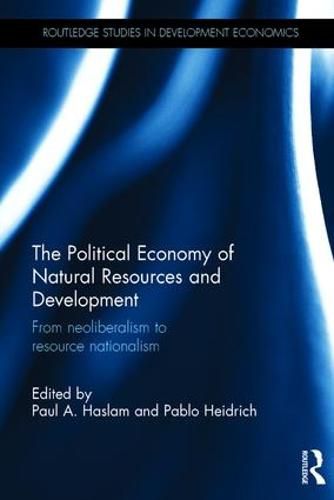Readings Newsletter
Become a Readings Member to make your shopping experience even easier.
Sign in or sign up for free!
You’re not far away from qualifying for FREE standard shipping within Australia
You’ve qualified for FREE standard shipping within Australia
The cart is loading…






The Political Economy of Resources and Development offers a unique and multidisciplinary perspective on how the commodity boom of the mid-2000s reshaped the model of development throughout Latin America and elsewhere in the developing world. Governments increased taxes and royalties on the resource sector, the nationalization of foreign firms returned to the mainstream economic policy agenda, and public spending on social and developmental goals surged. These trends, often described as resource nationalism, have developed into a strategy for economic development, generated a re-imagining of the state and its institutional possibilities, and created a new but very significant political risk for extractive enterprises.
However, these innovations, which constitute the most dramatic change in development policy in Latin America since the advent of neoliberalism, have so far received little attention from either academic or policy-oriented publications. This book explores the reasons behind these policies, and their effects on states, firms, and development trajectories. This text brings together renowned thematic experts to examine the political-economic causes of resource nationalism, as well as its manifestation in six Latin American countries. The causal variables considered by the contributors to this collection include a range of political-economic determinants of policy including commodity prices; the influence of ideology and national politics; ideas about industrial policy; relations between host governments and investors; and how countries respond to opportunities provided by regional initiatives and the new geography of the global economy.
This volume is essential reading in development economics, political economy, and Latin American studies, as well as for those who want to understand what economic development means after neoliberalism.
$9.00 standard shipping within Australia
FREE standard shipping within Australia for orders over $100.00
Express & International shipping calculated at checkout
The Political Economy of Resources and Development offers a unique and multidisciplinary perspective on how the commodity boom of the mid-2000s reshaped the model of development throughout Latin America and elsewhere in the developing world. Governments increased taxes and royalties on the resource sector, the nationalization of foreign firms returned to the mainstream economic policy agenda, and public spending on social and developmental goals surged. These trends, often described as resource nationalism, have developed into a strategy for economic development, generated a re-imagining of the state and its institutional possibilities, and created a new but very significant political risk for extractive enterprises.
However, these innovations, which constitute the most dramatic change in development policy in Latin America since the advent of neoliberalism, have so far received little attention from either academic or policy-oriented publications. This book explores the reasons behind these policies, and their effects on states, firms, and development trajectories. This text brings together renowned thematic experts to examine the political-economic causes of resource nationalism, as well as its manifestation in six Latin American countries. The causal variables considered by the contributors to this collection include a range of political-economic determinants of policy including commodity prices; the influence of ideology and national politics; ideas about industrial policy; relations between host governments and investors; and how countries respond to opportunities provided by regional initiatives and the new geography of the global economy.
This volume is essential reading in development economics, political economy, and Latin American studies, as well as for those who want to understand what economic development means after neoliberalism.